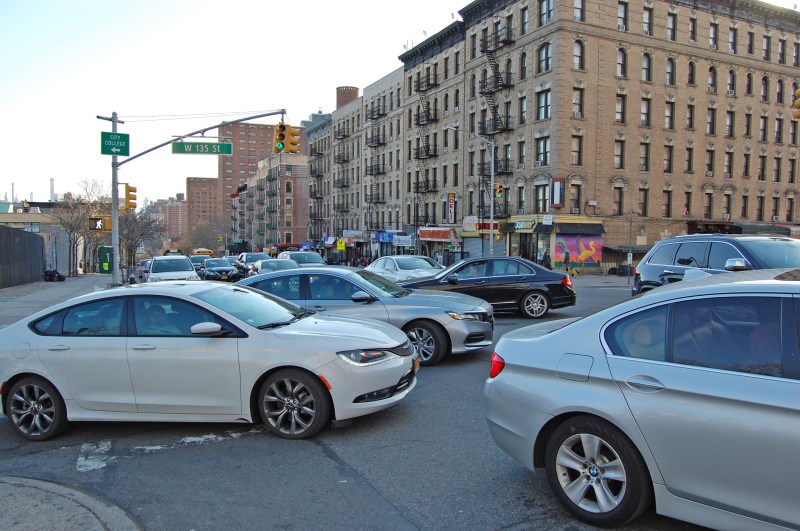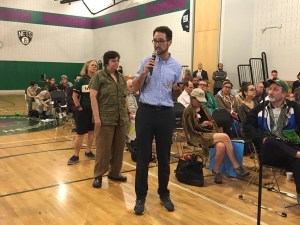FDNY: Traffic — Not Bike Lanes — is to Blame for Increased Response Times

No, bike lanes are not the problem.
The FDNY says there are three reasons why its emergency response times are up 25 seconds — or 8.6 percent — since 2015: An increase in population, and more construction and congestion — caused specifically by an increase in cars, according to Mayor de Blasio’s annual management report.
“Travel time increases may be partly attributed to continued population growth, with more vehicles on the road and more construction,” says the report, which was released late Tuesday.
Traffic, population growth and a construction boom is slowing down the FDNY's response time, data shows: https://t.co/bzLQLSIuOg
— katie honan (@katie_honan) September 19, 2019
Opponents of bike lanes have long argued that safer routes for cyclists have the unwanted effect of slowing down cars, so Streetsblog reached out to the FDNY to make sure the agency wasn’t forgetting Steve Cuozzo’s obsession.
And that still remains true — Streetsblog asked point blank if bike lanes play a role in slowing down emergency response times, but a spokesman for New York’s Bravest didn’t bite.
“Everything regarding the increase in response times is noted in the mayor’s management report,” FDNY spokesman Myles Miller said.
But the bike lanes! (Video I was able to take on my bike safely moved out of the way for the ambulance stuck in traffic behind cars) pic.twitter.com/qyImTikH1r
— Julianne Cuba (@Julcuba) September 17, 2019
Response times for both fire trucks and ambulances are the highest they’ve been in years in every category, including responses to structural fires, life-threatening medical emergencies, and all emergencies by fire companies, according to the report.
Specifically, the average response time by fire companies to all emergencies, which includes only the FDNY dispatch and travel time, now takes five minutes and 15 seconds — 25 seconds longer than it did in fiscal year 2015, which ran from July 2014 through June 2015.
But the main reason is all the cars on the road, which consistently double- and illegally park, and the onslaught of construction projects going on all over the city, which together block vital arteries for emergency vehicles, according to the FDNY. Car ownership in New York City is up 9 percent since 2010, Streetsblog reported previously. And since January, 2016, the total number of daily taxi trips in the city are up from roughly 675,000 in January, 2016, to roughly 1,095,000 by March, 2019 — an increase of 62 percent.
The increase is mostly due to the rise of Uber and Lyft — and the ex-president of the Uniformed Firefighters Association warned about it back in 2016, when he predicted that the city’s constant gridlock would pose a real risk to New Yorkers who are counting on their emergency responders to arrive quickly.
“Traffic in New York City is becoming more and more of a challenge for New York City firefighters,” Steve Cassidy, the then-union president, said at the time, when Uber and Lyft rides were at just about 200,000 per day instead of the 750,000 today. “Response times matter when people’s lives hang in the balance.” Cassidy lost his job after crashing his city vehicle while drunk driving.
So cars are the problem. Yet for some reason, the department’s rank-and-file — and many laymen bike critics — still spread the lie that bike lanes or other street safety improvements prevent first responders from arriving quickly at emergencies.
“Please consider the fact that emergency service is severely hampered every time a pedestrian plaza goes in,” said FDNY Lt. Adrienne Walsh during Tuesday night’s “Fort Greene Town Hall on the City’s War on Cars.” (Another such gathering is set for next Wednesday in Park Slope — also keyed to the supposed deleterious effect of bike lanes on FDNY vehicles.)
“What would you do if your house were on fire and the ambulances and fire trucks couldn’t get to you in time because of narrowed streets caused by bike lanes?” the meeting invite says.
https://twitter.com/sunflr85/status/1174484310507827200?s=21
And last year, locals in Queens were joined by then-Queens Rep. Joe Crowley in claiming that bike lanes were to blame for a firetruck stuck behind illegally parked cars on Skillman Avenue, where a protected lane had just been installed. The video of the incident, however, showed that illegally parked cars had blocked the firetruck. (And, as a footnote, Crowley lost his race for re-election, which may not be a mere coincidence.)
And as recently as Thursday, days after the report came out, firefighters broke from their own management — Uniformed Firefighters Association recording secretary Bobby Eustace told the Post that de Blasio’s Vision Zero initiative is to blame for increased response times.
“Vision Zero is fully intended to save lives from traffic accidents, but by [the city] adding in concrete barriers and flower pots and everything else like that, you’re basically eliminating the ability for emergency service vehicles to get around,” he told the paper.
Opponents of bike lanes also spread the myth that the Department of Transportation doesn’t care about emergency vehicle response times when it lays down bike lanes. In fact, the agency consults with the Fire Department before implementing street redesigns, according to Bike New York’s Jon Orcutt, a former top DOT official.
“DOT is actually very cautious about traffic impacts from street design changes. Emergency access is always taken into account,” he said.
Which makes the men and women in FDNY uniforms no better than typical uninformed NIMBYs, added Orcutt.
“Just one of the arrows in the quiver for the anti-bike lane crowd, it’s a standard go to for NIMBYs against street changes,” he said.
And the fallacy that bike lanes are to blame for slower emergency response times is not unique to just New York — Streetsblog SF spoke with one local firefighter there, who also rides a bike, who said that many of his colleagues’ views about biking are shaped by their windshield perspectives.
On Friday, after initial publication of this story, Mayor de Blasio defended its accuracy — and disputed the Post story. Appearing on the Brian Lehrer Show on WNYC radio, the mayor received a call from a 911 operator on an unrelated topic. Lehrer pivoted nicely to have her address the Post allegations. The exchange is telling:
Lehrer: Iliana, let me ask you one follow-up question, if you’re a 911 operator, maybe you have an observation that would help us report a story, because I see the firefighters union is blaming Vision Zero for a worrisome increase in response times, eight percent, or about 25 seconds per 911 call to the fire department. They blame concrete barriers, and flower pots, and other physical barriers intended to make traffic go slower. Is there anything that you can tell from your post as a 911 operator whether response times are down and if so, if anything is causing it?
Iliana: I mean, to be honest, we all live in New York City, it’s overcrowded. I mean New Yorkers, from my experience dealing with the general public, are not the best at cooperating at all.
At that point, de Blasio jumped in.
De Blasio: I was really surprised by that [Post story], Brian. I don’t find that accurate at all. First of all, the fire department is doing an amazing job. Fire deaths are down by 30 percent. They’ve done an extraordinary job protecting New Yorkers. I think Iliana is pointing out something crucial, it’s a very crowded city that’s gotten more crowded. More jobs, more residents, more tourists, and more construction. All of which are not, per se, bad things but they do create a lot of challenges on the roads. We’re trying to address congestion in a lot of ways. I think that’s the central issue facing the fire department. But Vision Zero is about saving lives. I mean this is the great irony of this critique – Vision Zero is clearly saving a lot of lives. It has now for five straight years. And that’s what we’re here to do. So there’s something, I think, really misses the mark in that analysis.

